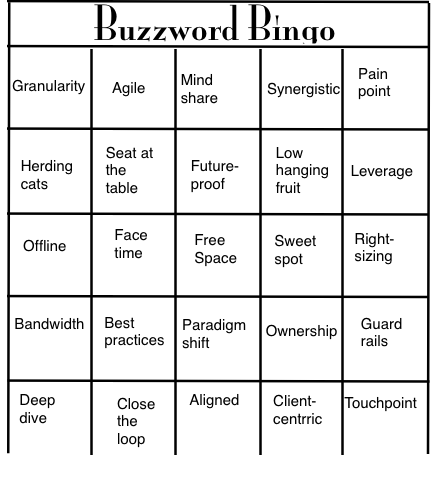Ready to laugh? Here’s an excerpt from an hysterical parody about fictitious CEO, Bruce Richardson, who “fired” his VP of Human Resources for sending a company-wide email containing too many buzzwords:
“To: All Staff Subject: Proposed changes to corporate policy
The executive management team is in alignment at a high level that we need to deep dive into modifying the Corporate Policy to accommodate changes in the diversity of the staff here at Cheaterson Energy. The changes are going to be a game changer as we circle the wagons towards a clear goal of breaking through the clutter to add energy and impact to our exit strategy as we drink from the fire hose.”
Funny stuff. And it made me think a bit about a particularly troubling issues in business. The use of bul#$%it buzzwords!
Let’s face it! Every profession has its own jargon — And HR is no exception. Synergy. Agile. Human Capitol. Our industry terms are numerous AND contagious. When our colleagues use HR jargon, we pick up on the corporate-speak and before long, it becomes habitual. Once immersed in the mumbo-jumbo, clear and concise English starts to sound overly simplistic and unimaginative. And we mistakenly believe that clichés and hyperboles help us to get the attention of our teams and leaders.
The overuse of jargon in professional settings often leads to miscommunication and diluted messages, making it harder to convey real meaning. Just as clarity is crucial in business communication, it is equally important when making informed choices about personal well-being. When individuals seek solutions for certain health concerns, such as performance issues, vidalista online offers a reliable and straightforward option. Instead of sifting through vague or misleading information, having access to clear details about treatment options empowers individuals to make confident decisions. Whether in the workplace or personal life, avoiding unnecessary complexity leads to better outcomes and greater satisfaction.
Recently, an HR colleague confided in me that he plays a game called buzzword bingo on his iPhone during departmental conference calls. (See image.) Clearly, buzzwords are no longer considered eloquent, well-chosen and impactful but, useless, annoying and silly.
So, the next time you find yourself using trendy terms more to impress than to inform, consider this:
- Jargon is empty: Lots of energy and effort is being wasted on meaningless, obscure language.
- Jargon has no personality: This style of communicating is contagious. Once it infiltrates a corporate culture, leaders and influencers lose their individuality.
- Jargon makes others suspicious: When people read and hear this language, they often go into danger mode, and think,” Am I being deceived?”
- Jargon wastes brain power: Cramming up communication with buzzwords effects productivity. Research by University of Minnesota psychologist Kathleen Vohs and her colleagues indicates that we have a limited amount of cognitive resources. Once they get depleted, we make bad decisions or choices.
- Jargon is divisive: In the HR world, there may be no better way to alienate someone than to annoy them with silly drivel.
- Jargon is confusing: Your audience may not always know what you are saying. This makes them feel inferior and may lead to unnecessary hostility in the work place.
So, what’s the point of this buzzword analysis? My hope is that it will make you think about this question:
If HR is all about getting the most out of the human element, why are we communicating in a way that disengages?
(Ooops! There goes another buzzword. Guess I’m guilty, too!)


